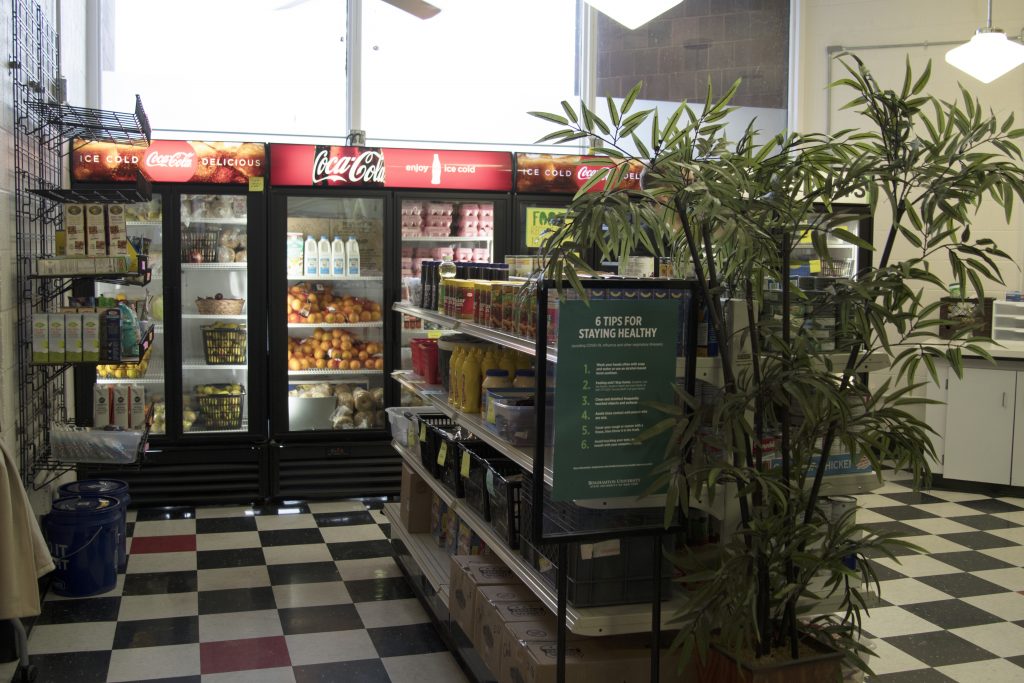The Binghamton University Libraries and the Multicultural Resource Center (MRC) are teaming up this semester to increase awareness of climate change and the fight against food insecurity.
Through a $1,000 grant from the American Library Association to help address the climate crisis, the BU Libraries are hosting various events, such as a virtual panel discussion with local experts. In addition to their designation as a Climate Resilience Hub, BU Libraries is collaborating with the MRC to create a food drive to assist with donations for the Bear Necessities Food Pantry from Feb. 1 to March 12.
Through this grant, the BU Libraries aim to help students who are struggling and help destigmatize the need for food support.
Jennifer Embree, biology and psychology librarian at BU and one of the librarians who initially applied for the grant, hopes that the drive will help students further understand the link between climate change and access to healthy food — not just for certain communities, but for everyone.
“We want to raise awareness about climate change’s impact on food security because we believe it to be one of the most concerning factors that our planet is currently facing and will continue to face for years to come,” Embree wrote in an email. “Climate change is having, and will have, a significant impact on the world’s food security because of rising temperatures, precipitation changes and a great frequency in extreme weather events. These factors can lead to changes in food availability, access and utilization across the globe.”
Linda Salomons, food pantry coordinator at BU, wants students to know that the University is dedicated to helping out students who struggle with food security issues. She said she feels this is especially relevant since many students may have lost their jobs or have reduced hours because of the COVID-19 pandemic and need the extra help to get by. However, climate change has also been impacting food supply and food security this past year.
“It’s important for students to understand that climate change can have an impact on food, if we can get healthy food for our pantry users [and] how much is available to us,” Salomons said. “Climate change affects so many things, including hitting those who are struggling with food insecurity.”
Matthew Pangburn, a sophomore double-majoring in political science and history, volunteers with the Bear Necessities Food Pantry and wants students to know that the pantry can help provide food and personal hygiene products to those who have trouble getting access to them.
“Food insecurity, specifically on college campuses, is an enormously underreported issue,” Pangburn said. “Being food insecure oftentimes can lead to students not performing as well academically or able to engage in social functions with friends. As you can imagine, not knowing if you have enough food to survive or where your next meal is coming from would be the most primary concern for you. The pantry offers our services as a way to help alleviate that stress and concern, allowing students to focus on things like school, activities and just trying to have the best experience possible at [BU].”
According to their website, the BU Libraries believe that climate change and food security issues often affect underserved populations and communities. At BU, the groups affected most by climate change are international students, the LGBTQ+ community and racial minorities. They are often left out of the conversation surrounding sustainability, according to a news release on BU Libraries’ website.
The MRC is committed to serving these groups, and Richie Sebuharara, assistant director of the MRC, believes that access to food can be different for those in certain communities in the Binghamton area that can be classified as food deserts, or areas that don’t have many, if any, supermarkets and grocery stores and little access to healthy food.
“One of the things that we’ve discussed with [BU Libraries] is the areas in Binghamton that don’t have supermarkets and grocery stores, such as the North Side of Binghamton,” Sebuharara said. “Some areas that might have residents in a lower socioeconomic class don’t have the same opportunities for food as areas with residents of a higher class.”
Embree also hopes that the food drive can help the BU community become more aware of food security issues that some students, staff and Binghamton residents face daily.
“I hope that students, faculty and staff will be able to gain more awareness about the issue of food insecurity in general, and I also hope that students will learn about really useful resources that can help support them if they are experiencing food insecurity themselves,” Embree wrote. “We also hope that this food drive will help promote a more open, understanding and judgement-free approach to discussing and addressing food support for students on campus.”
For those who want to learn more about the links between food insecurity, college students and climate change, follow @bingulibraries on Instagram for more information and weekly posts about the drive.



